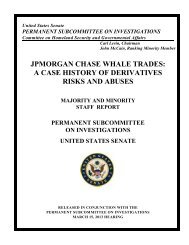JPMORGAN CHASE WHALE TRADES: A CASE HISTORY OF DERIVATIVES RISKS AND ABUSES
JPMORGAN CHASE WHALE TRADES: A CASE HISTORY OF DERIVATIVES RISKS AND ABUSES
JPMORGAN CHASE WHALE TRADES: A CASE HISTORY OF DERIVATIVES RISKS AND ABUSES
You also want an ePaper? Increase the reach of your titles
YUMPU automatically turns print PDFs into web optimized ePapers that Google loves.
9<br />
incorrect information, and at other points the OCC failed to notice and follow up on red flags<br />
signaling increasing CIO risk in the reports it did receive from the bank. During 2011, for<br />
example, the notional size of the SCP grew tenfold from about $4 billion to $51 billion, but the<br />
bank never informed the OCC of the increase. At the same time, the bank did file risk reports<br />
with the OCC disclosing that the CIO repeatedly breached the its stress limits in the first half of<br />
2011, triggering them eight times, on occasion for weeks at a stretch, but the OCC failed to<br />
follow up with the bank. Later in 2011, the CIO engaged in a $1 billion high risk, high stakes<br />
credit derivatives bet that triggered a payout of roughly $400 million to the CIO. The OCC<br />
learned of the $400 million gain, but did not inquire into the reason for it or the trading activity<br />
behind it, and so did not learn of the extent of credit derivatives trading going on at the CIO.<br />
In January 2012, in its first quarterly meeting with the OCC after disclosing the existence<br />
of the SCP, the CIO downplayed the portfolio’s importance by misinforming the OCC that it<br />
planned to reduce the SCP. Instead, over the course of the quarter, the CIO tripled the notional<br />
size of the SCP from $51 billion to $157 billion, buying a high risk mix of short and long credit<br />
derivatives with varying reference entities and maturities. The increase in the SCP’s size and<br />
risk triggered a breach of the CIO’s and bankwide VaR limits, which the bank disclosed to the<br />
OCC in routine risk reports at the time, but which did not trigger an agency inquiry. Also in<br />
January, the bank sent routine risk management notices which informed the OCC of the bank’s<br />
implementation of a new VaR model for the CIO that would dramatically lower the SCP’s risk<br />
profile, but the OCC did not inquire into the reasons for the model change, its impact on risk, or<br />
how the CIO was able to reduce its risk results overnight by 50%.<br />
In February and March, the bank began to omit key CIO performance data from its<br />
standard reports to the OCC, while simultaneously failing to provide timely copies of a new CIO<br />
management report. The OCC failed to notice the missing reports or request the new CIO<br />
management report until after the April 6 press articles exposed the CIO’s risky trades. By<br />
minimizing the CIO data it provided to the OCC about the CIO and SCP, the bank left the OCC<br />
misinformed about the SCP’s risky holdings and growing losses.<br />
Beginning in January and continuing through April 2012, the SCP’s high risk<br />
acquisitions triggered multiple breaches of CIO risk limits, including its VaR, credit spread,<br />
stress loss, and stop loss limits. Those breaches were disclosed on an ongoing, timely basis in<br />
standard risk reports provided by the bank to the OCC, yet produced no reaction at the time from<br />
the agency. The Subcommittee found no evidence that the OCC reviewed the risk reports when<br />
received, analyzed the breach data, or asked any questions about the trading activity causing the<br />
breaches to occur.<br />
On April 6, 2012, when media reports unmasked the role of JPMorgan Chase in the<br />
whale trades, the OCC told the Subcommittee that it was surprised to read about the trades and<br />
immediately directed inquiries to the bank for more information. The OCC indicated that it<br />
initially received such limited data about the trades and such blanket reassurances from the bank<br />
about them that, by the end of April, the OCC considered the matter closed.



